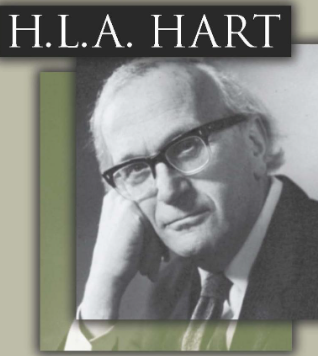- Book – “Concept of Law”.
- He bridges the gap between Savigny, Ehrlich and others, on one hand and Austin, Kelsen and others on the other.
- Hart is also said to be belonging to the modern ‘natural school’.
- Primary Rules Those rules which are valid according to the system’s ultimate criteria of validity and must be obeyed. (Primary rules)
- Secondary Rules Rules of recognition. They must be effectively accepted. (Secondary rules).
- International law is a ‘Primary Rule’ and therefore, it is ‘Law’.
Law as a system of Rules – Rules are concerned not with what happens but with what ought to happen; they are prescriptive i.e. they prescribe a code of conduct. Rules can be defined as code of conduct which is observed with the attitude of feeling that such conduct is obligatory. This feeling is not a psychological illusion and a person who is required by the rule to act in a certain way and who conforms to such a pattern of behavior, will require the same from others. Law is union of Primary Rules and Secondary Rules.
- Hart defines law: “Law then consists of rules which are of broad application and non- optional character, but which are at the same time, amenable to formalisation, legislation and adjudication.”
- According to Hart, a legal system arises from a combination of primary and secondary rules.
Primary rules are those which simply impose duties while secondary rules are power conferring rules.
According to Hart, it is secondary rules of recognition, which transfer a set of unrelated rules into a unified dynamic legal system capable of adaptation to social change.
Thus IPC – Primary Rule, Constitution – Secondary Rule
- Sanction is not an essential element.
- Emphasizes upon the socially constructive function of law.
· Hart’s System of Rules:
Social Rules

Hart

| Primary Rule | Secondary Rule |
| The code of behaviour which society prescribed are called primary rules because these set of rules are the once on which basis the entire behavioural patterns of society and this do not allows deviationfrom such primary rule though Hart has not talked about sanction as such. The element of sanction squarely creeps into his theory on the basis of fact that primary rules are mandatory upon the people. | However, the primary rule can not be static. They got inherent dynamism because the society is dynamic. Therefore, there should be need to take care such dynamism and to bring about livingly & orderly changes in law for such changes there have to be same set of principles organ which would function according to some set guideline. For this purpose, secondary rules are created. For instance, the Indian society in this content the Indian Constitution which provide various organs for govt. and lays down the various principle under which the organ will function. It can be called secondary rule. |
According to Hart, it is the primary rule which is more important than secondary rule. However, as far as fundamental aspect is concerned such as fundamental rights, directive principles of state policy, they are still a part of primary rule.


